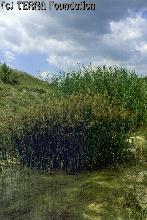


|

|

|
| ||

|
|
 Nadas
(or originally Nádas) is the Magyar (or equivalently Hungarian) word for a
swamp filled with reeds. Each of these reeds is called a "nád". Their
Latin name is "Scirpo
- Phragmitetum." According to family legends our ancestor adopted this
surname when he came to Hungary after the French Revolution.
Interestingly enough, we have contacted several dozen other individuals who bear
this name, and it appears that their families also took up this name for a
variety of similar reasons although none of them came from France nor do they
appear to be related to us.
Nadas
(or originally Nádas) is the Magyar (or equivalently Hungarian) word for a
swamp filled with reeds. Each of these reeds is called a "nád". Their
Latin name is "Scirpo
- Phragmitetum." According to family legends our ancestor adopted this
surname when he came to Hungary after the French Revolution.
Interestingly enough, we have contacted several dozen other individuals who bear
this name, and it appears that their families also took up this name for a
variety of similar reasons although none of them came from France nor do they
appear to be related to us.
One of my mentors and a major
contributor to this site, Istvan Imre Szappanos, told me that he has a different
theory for the origin of the Nádas name based on his Hungarian genealogical
research. According to him original Hungarian names are usually one of two
types. They can be names of places followed by an ending like (-i, or -y) which
conveys the same meaning as the German "von". They can also be names
of occupations such as Kovács (meaning Smith). He thinks that Nádas might have
at one time been an occupation like that of Zs˙pos (meaning Thatcher) or
someone who covered roofs with reeds. I guess if I have a choice I'd prefer to
be a thatcher than to be someone who resides in a swamp.

Although the English form of the name appears to be related to the Spanish word nada, meaning nothing, we have no reason to believe that our ancestor considered this. Continuing in this vein, we have read a suggestion the the decade that comes after the nineties be called the nadas (instead of the zilches or the naughts). Would this have made 2000-2009 "our decade"? ; )
This web site is dedicated to anyone who bears our surname and is an attempt to forge an electronic link among us.
 |
 |
 |

|
 |
Idõkereke, mondd miért rohansz oly nagyon?
Miért nem hagysz minket kissé parlagon,
Mi volna, ha egyszer magaddal nem sodornál,
Mi volna, ha egyszer nélkülünk loholnál?
Idõkereke, csak Te tudod, mit hoz a holnap,
Az ember Tõled ingyen semmit sem kap,
Nincs, aki megtudna állitani Téged
Vágtatsz, s magaddal rántod az emberiséget.
Idõkereke, emlékszel, gyermek voltam én is,
Sohse hittem, hogy egyszer foglalkozni fogok veled mégis,
Te vagy az oka, hogy fölöttem is elmultak a napok, az évek,
Lassanként rám is mutogatnak, mit keresnek itt ezek a vének?
Idõkereke, oly jó voltál hozzánk éltünk tavaszán
Miért bánsz velünk most mégis oly mostohán?
Ifjuságunk jegyében Te hoztál elénk minden szépet
Írök igéretet akkor, örök reménységet.
Idõkereke, tudjuk, elhullik közülünk aki sors,
Lehet egy napos, ifju, vagy egész koros.
Minden vágy, rözsaszinü álom hamis,
Elöbb - utóbb a föld alatt leszek magamis.
Idõkereke, mi lenne, ha egyszer mégis megálnál,
S velünk, emberekkel, bujócskát játszanál?
Eltünnél rövidebb, - hosszabb idöre, -
Hidd el, jó lenne ez egészségesre, s szenvedõre.
Idõkereke, hamár oly kegyetlen rideg vagy,
Legalább a fiatalságnak idõben jelt adj,
Figyelmeztess elõre minden nemzetet népet,
Sohase adják fel az örök reménységet.
Idõkereke. Ne felejtsd. az igaz örök élet egyetlen titka:
Békében, szeretetben élni, ami nagyon ritka, -
A Hit, A Béke és a testvériség
Ez legyen mindenki részére örök reménység.
dr. Nádas Gyula
1948 Nov. 28
vocabulary:
parlagon - to be left fallow
sodorni - to carry with the current
loholni - to hurry along
vágtatni - to gallop